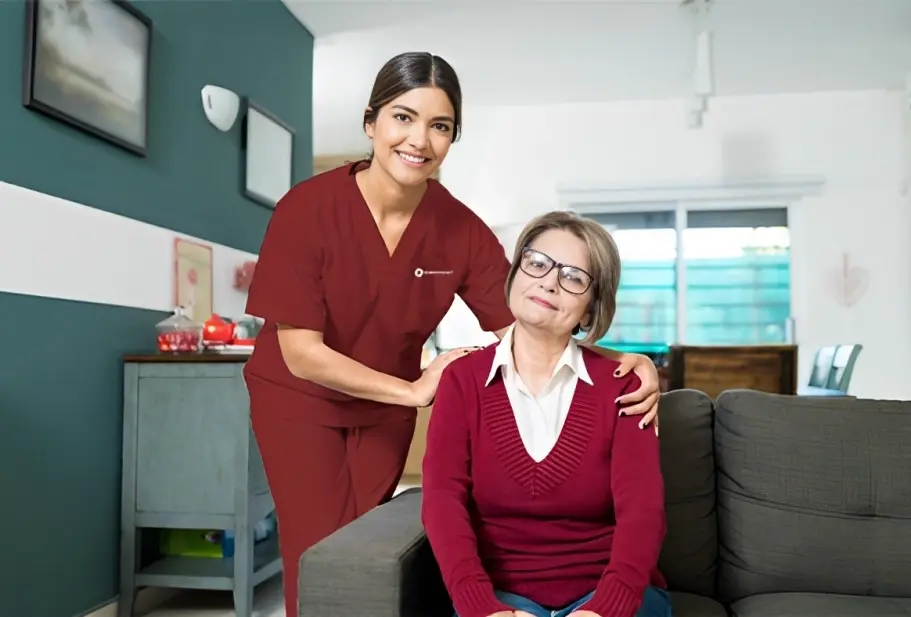Learning how to care for a loved one with Alzheimer’s or another type of dementia can be a challenging and emotional journey. Because there is currently no cure for Alzheimer’s, it is often the care and support of family members that make the biggest impact on a person’s quality of life. However, as a person’s physical and mental health begins to diminish, it is common for family caregivers to feel frustrated or overwhelmed.
If you’re caring for a person with Alzheimer’s or dementia, it’s important to remember that you are not alone. Whether you currently provide daily care or you’re making the decision to seek out professional home care services, there are resources available to help you make the best decisions for your loved one and yourself.
Early Warning Signs of Alzheimer’s and Dementia
Alzheimer’s is a type of dementia, a general term for loss of memory and other mental abilities severe enough to disrupt daily life. There are several early warning signs of Alzheimer’s. However, even one symptom is enough to warrant scheduling an appointment with a doctor. If your loved one exhibits any of the following early signs of dementia, they should not be ignored:
- Memory loss that disrupts daily life
- Challenges with problem-solving
- Difficulty completing familiar tasks
- Confusion with time or place
- Misplacing things
- Changes in mood or personality
- Decreased or poor judgment
Stages of Alzheimer’s

Alzheimer’s is a slowly progressing disease that typically occurs in three stages – early, middle, and late. However, no two cases of Alzheimer’s are the same, and everyone will experience the symptoms of the disease slightly differently. That being said, there are features of each stage that you can begin to prepare for as a caregiver.
Early Stage
During the early stage of Alzheimer’s, a person may seem to function relatively normally and independently. They may still be able to drive, maintain a job, and take part in social activities. However, family members will likely notice the person having frequent memory lapses, such as forgetting familiar words or the location of everyday objects. Other common difficulties during the early stage of Alzheimer’s include forgetting material that was just read, losing or misplacing valuable objects, and increased trouble with planning or organization.
At this stage, people with Alzheimer’s are usually still capable of taking control of their health and can focus their energy on making decisions that will improve their quality of life in the future. The early stage is also an ideal time to make financial, legal, and end-of-life plans since the person with dementia can still participate in the decision-making process.
Middle Stage
Middle-stage Alzheimer’s is typically the longest stage, often lasting several years. Once a person reaches this stage, they will need significantly more help and a greater level of care. Signs of the disease will be increasingly apparent and more pronounced. The person will also likely confuse their words, become unexpectedly angry or frustrated, or behave in unusual ways, such as refusing to bathe. Still, patients in the middle stage of Alzheimer’s may retain much of their independence. Because of this, it’s essential to figure out what a person can do on their own or find ways to simplify their daily tasks.
As the disease progresses and the need for more intensive care increases, caregivers in this stage may benefit from part-time, professional home care options. Hiring a home health aid (HHA) or caregiver can provide a much-needed mental health break while still ensuring your loved one receives safe, high-quality care.
Late Stage
In late-stage Alzheimer’s, symptoms of dementia are severe and require extensive full-time care. The person will have extreme difficulty or completely lose their ability to carry on conversations, respond to their environment, and control their movement. They may still be able to speak and form sentences, but it will be hard for them to communicate pain as their cognitive skills continue to decline. Significant personality changes are also common in this stage, making the experience particularly challenging for the patient’s loved ones.
A person living with late-stage Alzheimer’s will benefit from fewer challenging interactions, such as listening to calming music or receiving support and reassurance from a gentle touch. Caregivers and loved ones may also benefit from home care support services, such as hospice care, meant to provide comfort and dignity to patients at the end of their life.
Emerest

At Emerest Health, we offer professional home care and specialized healthcare services for individuals with Alzheimer’s or dementia. We are committed to providing high-quality care, focusing on compassion and individualization to best serve you and your loved one.
At our Connecticut, New York, and New Jersey locations, we offer home care services with professional Home Health Aides (HHAs). Our caregivers are highly trained in caring for patients with Alzheimer’s and dementia. Our New York and New Jersey locations also offer Emerest Care, a Remote Patient Monitoring (RPM) program customized to monitor solutions based on patients’ individual needs.
If you’re interested in our home care services, contact us today to hire a caregiver or get paid to care for your loved one.